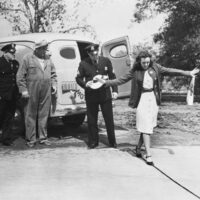Different Types Of Sobriety Tests In Maryland DUI Cases

There are three different types of test used to determine the sobriety of a driver in Maryland. Those are field sobriety tests, breathalyzer tests, and blood tests. Of those, blood tests are the most accurate while field sobriety tests are the least accurate. In this article, the Maryland criminal defense attorneys at Schlaich & Thompson will review each of the three different types of tests.
Field sobriety tests
Field sobriety tests are administered roadside when you are pulled over. The National Highway Traffic Safety Administration (NHTSA) recognizes three types of sobriety tests that are performed universally across the United States. Those are:
- The horizontal gaze nystagmus – A police officer will ask you to follow a pen, finger, or small flashlight with your eyes (not using your head). The officer is looking for something called nystagmus or a wobble in your eye. If your eyes move in a staggered motion, he will likely assume that you are under the influence of drugs or alcohol. A supposedly sober person’s eyes will move in a smooth motion.
- The walk and turn test – There are two phases to the walk and turn test. The first phase is instructional. The detainee is asked to stand with their right foot in front of their left foot and their hands at their sides while the officer issues the instructions for the test. The detainee is then asked to walk in a straight line, heel to toe, and then turn. If they cannot do so without losing their balance, then the officer can fail them. Any failure to follow instructions, regardless of how nervous you are, is interpreted as a sign of intoxication.
- The one-legged stand – During the one-legged stand, an individual would be asked to stand on one leg and then count to 30. The officer is looking for any signs of lack of balance. It doesn’t matter if you have bad knees. The officer will likely assume you are drunk.
You can refuse a field sobriety test in Maryland. You may also refuse a request for a portable breathalyzer test at the roadside. You cannot refuse a request for a formal breathalyzer test at the station without additional consequences.
Portable breathalyzer tests and blood tests
An officer may administer a portable breathalyzer test (PBT). The test is not admissible in a court of law. However, it can be used to give the officer probable cause to arrest you on suspicion of DUI. The officers can administer other tests back at the police station that will establish your BAC and those can be used in a court of law. However, the portable breathalyzers are not considered scientific enough for that purpose.
Blood tests are considered the most accurate. They cannot, however, be administered by police officers without the proper training. They test blood alcohol levels directly. The test is performed by heating up the blood to evaporate the alcohol. The amount of alcohol that is evaporated can be measured to reliably establish the driver’s BAC.
Talk to a Bel Air, MD DUI Defense Attorney Today
Schlaich & Thompson represent the interests of those charged with DUI in Maryland. Call our Bel Air DUI lawyers today to schedule an appointment and we can begin discussing defense strategy immediately.























